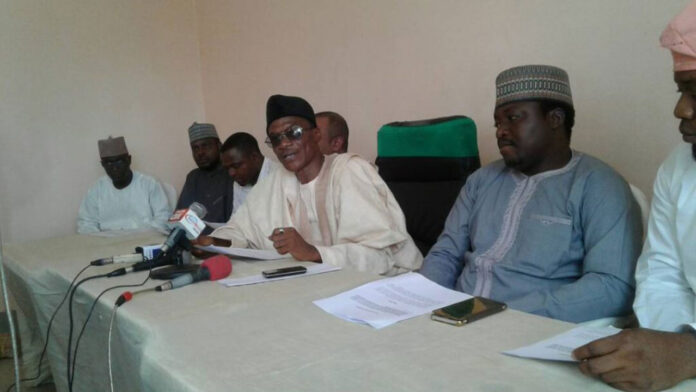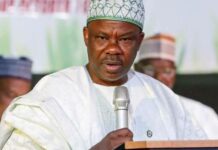In a week that has been described as a dust storm, leading groups from the three major geopolitical zones in Nigeria have issued strong statements condemning an interim government, which has crept into national discourse, a report by The Guardian stated. The Yoruba, Igbo, and Hausa groups all joined voices in condemnation of the plot, which was uncovered by the Department of State Services (DSS) last Wednesday.
According to the DSS, some key players are plotting to install an interim government and prevent President-elect Asiwaju Bola Tinubu from being inaugurated as president. The Afenifere, a Yoruba socio-political organization, has warned against any action that could jeopardize the handing over of power to elected officers on May 29.
Mr. Jare Ajayi, the embattled National Publicity Secretary of Afenifere, issued a statement yesterday, purportedly on behalf of the group. In the statement, he expressed concern about the steps being taken that could be prejudicial to the swearing-in of the winners of the just concluded general elections.
Ajayi highlighted attempts to rubbish the outcome of the elections, especially the presidential election that held on February 25, as well as the resuscitation of calls for the formation of an interim government. He also noted protests or rallies being conducted, especially in Abuja and America, against the result of the said election.
Afenifere is worried about the untoward development because of how it is gaining currency in the country and even outside the shores of the land. Ajayi reminded those fanning the embers of non-inauguration of elected officers to be aware that the monster being courted would affect not only the presidency to be headed by the winner of the election, Tinubu.
READ ALSO: Pro-democracy Group Protests Against Opposition’s Plot to Undermine Nigerian Democracy
“The disruption will affect all other tiers of government as well as governors at the state level, lawmakers at the national and state levels, and perhaps, the local councils.
“There is, therefore, the need to exercise a lot of caution. The laws of the land created avenues to seek redress when we are aggrieved. We enjoin those who may not be satisfied with the outcome of the concluded elections to seek redress through the established channels and not through any other means. It is also important to let members of the public realise that anything short of following due process, particularly, in the swearing-in of winners of the just concluded elections, constitutes grave dangers for the country. This must not be accepted or encouraged at all because of its dire consequences,” the group said.
Ajayi, in addition, urged the judiciary not to entertain any cases that may be brought to derail the hard-earned civil rule, and consequently, scuttle Nigeria’s democracy. However, when asked to clarify the statement, the leader of Afenifere, Pa Ayo Adebanjo, said that Ajayi has no authority to issue statements on behalf of the organization, as he had been suspended, as announced in a previous communiqué.
Adebanjo went on to urge the public, particularly the media, to disregard any statements made by Ajayi on behalf of the group. Similarly, the Chidi Ibeh-led faction of Ohanaeze Ndigbo released a statement yesterday, asserting that the Ndigbo will not participate in any conspiracy to install an interim government. Instead, they are making arrangements to attend the inauguration of Tinubu on May 29.
In a statement released in Abakaliki, the Secretary-General of Ohanaeze Ndigbo, Mazi Okechukwu Isiguzoro, challenged the DSS to arrest those behind the interim government scheme and ensure that they are brought to justice “those unpatriotic elements of destruction did not derail our democracy,” adding that their evil intent to forestall the smooth transition of power have hit the rock.
He emphasized that the Ndigbo not only denounce the demand for an interim government but also demands that the President-elect be inaugurated by May 29th. He also pointed out that the Ndigbo have been a marginalized group in Nigeria and have been endangered and “never again will Igbos be used as sacrificial lambs as we were used in 1993 during the Abiola saga, where a lot of Igbos were bullied, maimed, killed and their property looted.”
According to the statement: “Ndigbo will never recognise any interim government or be part of the evil scheme, as the clamour for an interim government is unconstitutional, satanic and atrocious, and those behind the call are only trying to plunge the country into avoidable political crises and make the Igbos scapegoats as Nigerians witnessed in 1993.
“The proponents of an interim government are already setting the stage through systematic burning of Igbo populated markets in Lagos (President-elect’s state) and Borno (Vice President-elect’s state) and promotion of hate campaigns against the Igbo. These are castles built on quicksand.
READ ALSO: Editorial: Strengthening Inspection of Election Materials to Deepen Poll Credibility
“Igbos are wiser and sophisticated now and we will continue to support the President-elect and ask him to commence the healing process tour from the Southeast by releasing IPOB leader, Nnamdi Kanu and incorporate the Southeast into the Government of National President (GNU) by giving the President of the Senate to the people of the region.
“Ndigbo will participate fully in all pre-inauguration and swearing-in ceremonies of the President-elect on May 29 and caution all of those who are working behind the scenes for the enthronement of an illegitimate interim government to use the courts to vent their resentments and grievances.
“We are satisfied that Atiku Abubakar and Peter Obi have explored the legal options to recover their mandates and challenging the outcomes of presidential election in court is better than restraining a smooth transition of power. We will not allow unpatriotic monsters to truncate our hard-earned democracy,” the group said.
A Northern group, Arewa Youth Assembly (AYA), has voiced its strong opposition to the suggestion of an interim government in Nigeria. On Monday, the group issued a statement through its Speaker, Mohammed Salihu Danlami, stating that such calls were not in the country’s best interests and could result in increased instability and political uncertainty.
The group maintained that there was no need for such calls as the recently held elections were fair and credible.
To him, “as a youth organisation committed to the unity and progress of Nigeria, we are deeply concerned about the recent calls for an interim government to take over from the current administration. We believe that such a move would be unconstitutional and could set a dangerous precedent for our democracy.
“We are of the view that since the general elections were largely fair and credible due to the introduction of the Bimodal Voter Accreditation System (BVAS) and winners have emerged, there is nothing that should warrant calls for the formation of an Interim National Government (ING).
“We believe that supporting the transition programme of the present government while taking advantage of the courts to seek redress is the best way to ensure political stability and continuity in Nigeria.
“We also urge all stakeholders to engage in constructive dialogue and work towards finding solutions to the challenges facing our nation because it is only by working together that we can build a strong, united, and prosperous Nigeria for all.
“AYA strongly opposes any move to enforce an interim government in Nigeria. We call on all Nigerians to support the current administration and Tinubu, and work towards a better future for our nation,” he said.
In related news, Dr. Olisa Agbakoba, a former president of the Nigerian Bar Association (NBA), has proposed that the speedy handling of presidential election petitions is a crucial strategy against the possibility of an interim government.
In a statement issued on Thursday, Agbakoba urged all Nigerians to reject any secret plans that might be in place to derail the country’s democratic system. In a subsequent statement on Friday, the senior advocate suggested that an interim government would be unnecessary if the petitions are heard and resolved before May 29th.
“The tension around the call for an interim government is that the presidential election petition may not conclude before the inauguration of a new president on May 29, but it’s very possible to conclude these petitions, provided the court systems are very proactive.
“Under arbitration matters, procedural orders and or directions issue peremptorily to resolve sometimes very complex jurisdictional and procedural issues. The presidential election tribunals are urged to adapt the procedures very familiar with speedy conclusion of arbitration matters.”
Agbakoba identified three critical issues in the presidential election petitions that, he believes, can be resolved through the implementation of procedural orders and directions.
READ ALSO: Soyinka Advocates Southeast Presidency for Civil War Healing
“The first is the interpretation of Section 134 of the 1999 Constitution of Nigeria as to whether securing 25 per cent of votes in the Federal Capital Territory (FCT), Abuja, is compulsory to be a president.
“Secondly, is a candidate permitted to stand for presidential or vice presidential election when he is at the same time a senatorial candidate?
“The third point is the issue relating to the qualification of candidates to stand for presidential election.
“If the petitions were arbitration proceedings, an arbitrator may issue a procedural order directed to counsel to address all complex disputes and the arbitral tribunal will deliver what is called a partial final award,” Agbakoba said.
“In the case of the presidential election tribunal, including the Supreme Court, they can also direct procedural orders with very short timelines given to counsel, to address the complex jurisdictional issues raised in the petitions and the tribunal/supreme court will then issue final summary judgment as appropriate.
“We strongly believe that between the tribunal and Supreme Court, the petitions can be resolved within seven days from today. This will cool the temperature in Nigeria on the issue of interim government etc.
“The speed proposed here requires a radical departure from our present judicial policy where case management plays a very limited role in judicial outcomes. Case management is the spirit and driving force of modern adjudication. Speed of justice is the mantra that our judiciary must proclaim very loudly. This is needed in the presidential petition proceedings urgently,” he said in the statement.
The time limit prescribed by law for the hearing and delivery of judgment on an election petition is 180 days from the date of filing the petition. Similarly, an appeal arising from the decision of an election tribunal or court must be heard and concluded within 60 days from the date of the tribunal’s judgment.
Source: The Guardian







[…] READ ALSO: Afenifere, Ohanaeze and Arewa Youths Unite Against Interim Government Scheme […]
Comments are closed.